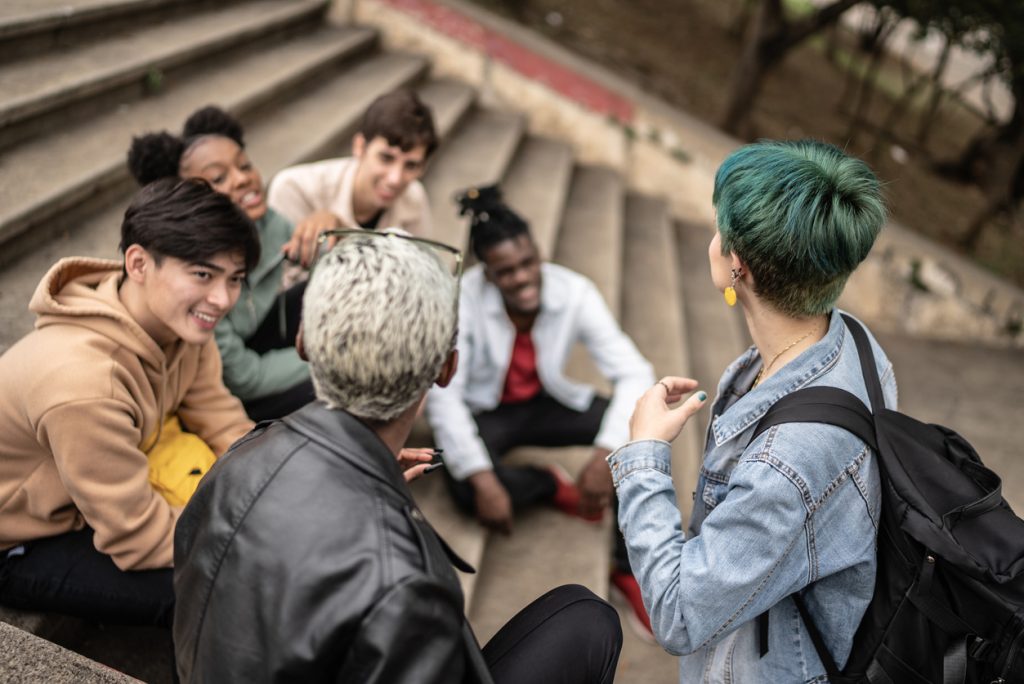“Used To” Vs. “Be Used To” Vs. “Get Used To”
English can be a complex language, especially with irregular verbs, which we’ll explain in a moment. However, once you start understanding English like a native, as we’ll help you do in this article, even seemingly difficult things become easy.
First, “regular” verbs follow a pattern, like this:
walk – walked
talk – talked
play – played
“Irregular” verbs BREAK patterns:
go – went (not “goed”)
fly – flew (not “flyed”)
Today, we’ll look at two very common irregular verbs that English learners can get stuck on: “be” and “get.” We’ll also explore three very commonly-used phrases: “used to,” “be used to,” and “get used to.”
Table of Contents
- Understanding The Irregular Verb “Be”
- Understanding The Irregular Verb “Get”
- “Used To” vs. “Get Used To” vs. “Be Used To”
Learn to use thousands of native words and grammar points the native way in our Fluent For Life English learning program.
Understanding The Irregular Verb “Be”
The verb “be” means “to exist.” The conjugation for the verb “to be” in its present, past, and future tense is as follows:
Present / past / future conjugation of “to be:”
- I am / I was / I will be
- You are / you were / you will be
- He, she, it is / he, she, it was / he, she, it will be
- We are / we were / we will be
- You (plural) are / you (plural) were / you (plural) will be
- They are / they were / they will be
How To Use the Irregular Verb “Be”
“Be” is so useful because it can describe ANYTHING, from states and locations, to actions:
This is a table.
He is tall.
Those are interesting ideas.
She uses an umbrella when the weather is rainy.
She is a talented musician.
That movie is boring.
I am passionate about learning languages.
The library is on Main Street.
Our office is in the city center.
They were excited about the upcoming event.
We will be in touch soon regarding your application.
I am reading.
They were watching a play.
Understanding The Irregular Verb “Get”
The verb “get” is another irregular verb with multiple meanings and uses. At its core, the verb “get” means “to obtain, receive, or buy” something. Here is how to use it in its present and past conjugation:
- I get / I got
- You get / you got
- He, she, it gets / he, she, it got
- We get / we got
- You (plural) get / you (plural) got
- They get / they got
How To Use The Irregular Verb “Get”
“Get” can be used to show that something or someone has acquired or obtained something. Think of “get” as going to a different position, like moving from one place to another, or becoming something new. Examples include:
Did you get the mail I sent? (The mail went from me to you.)
I got a present from my mom! (The present went from my mom to me.)
I need to get a new passport. (The passport moves from the office to me.)
The weather is getting warm. (The weather moves from cold to warm.)
She is getting tired of the same routine. (She’s moving from interested to bored.)
I got a promotion at work. (The promotion came from my boss.)
He didn’t get what I was explaining. (My meaning wasn’t transmitted to him. He didn’t understand me.)
“Used To” vs. “Get Used To” vs. “Be Used To”
Now that we have a good foundation, we can look at: “used to,” “get used to,” and “be used to.” Watch closely, since these phrases look similar.
Used To
When you think of “used to,” think of things you did that you no longer do. Maybe it’s a habit, or an activity, like in these examples:
- I used to play with dolls when I was little.
- My dad used to ride his bike to work.
- We used to have pizza for dinner every Friday night, but now we have tacos.
- Jenny used to watch cartoons every Saturday morning, but now she prefers to read books.
- Grandma used to knit sweaters for us, but now she bakes cookies instead.
- Sam used to have a pet goldfish, but now he has a pet hamster.
- Sarah used to go to dance classes, but now she plays soccer.
- We used to live in a small apartment, but now we live in a house.
- Tim used to have a bedtime story every night, but now he reads books on his own.
- The park used to be empty in the mornings, but now it’s always full of people playing.
See how each of these sentences talks about something that happened regularly in the past, but doesn’t happen anymore?
WARNING: Natives often sound like they’re saying “use to” when they say “used to,” because “use to” is faster and easier. The correct term, however, is “used to.”
How Often Something Used To Happen
We can also talk about how often something happened. Notice how these “adverbs of frequency” can be placed in different places in a sentence, and still be correct:
- She used to visit her grandparents often on weekends.
- They rarely used to eat out because they preferred home-cooked meals.
- We used to occasionally go camping in the summer.
- He frequently used to travel for work before he got a remote job.
- Jenny sometimes used to sometimes stay up late watching movies with her siblings.
- The old library used to regularly host community events.
- When I was younger, I hardly ever used to eat vegetables.
- My parents used to usually take us to the beach for vacation.
- We used to seldom see snow in our hometown, so we always cherished the rare snow days.
- I always used to play soccer with my friends after school.
Did NOT Use To
The following examples describe something that did NOT use to happen. Note how we say “use to” instead of “used to,” because “did” already indicates the past:
- I did not use to drink coffee, but now I enjoy it every morning.
- We didn’t use to have smartphones when I was a child.
- She did not use to eat spicy food, but now she loves it.
- They didn’t use to live in this neighborhood; they moved here recently.
- He didn’t use to play the guitar, but he started taking lessons last year.
- My grandparents did not use to own a car; they relied on public transportation.
- We didn’t use to watch much television, but now we have streaming services.
- The company did not use to offer remote work options, but they implemented them last year.
- Sarah didn’t use to exercise regularly, but now she goes to the gym every day.
- They did not use to celebrate Halloween in our country, but it’s becoming more popular now.
Questions With Used To
Again, we say “use to” when asking questions about the past, instead of “used to,” since “did” indicates the past:
- Didn’t you use to play soccer when you were younger?
- Did your grandparents use to live in the countryside?
- Did she not use to have long hair before she cut it short?
- Did they use to go camping every summer?
- Didn’t your brother use to collect stamps as a hobby?
- Did you use to eat candy every day when you were a child?
- Did your family not use to have picnics in the park on weekends?
- Did he use to walk to school or take the bus?
- Did she not use to visit her grandparents during the holidays?
- Didn’t your parents use to tell you bedtime stories when you were little?
You’ll naturally become familiar with these constructions as you get more examples. In other words, you’ll “get used to” them!
Get Used To
Imagine you’re starting a new job. It’s your first day, so you’re not feeling very confident, and you’re not very good at the work.
But, over time, you might “get used to” doing the job. You go from inexperienced, to performing the job well. See how you “get,” or become, “used to” doing the work?
We’re moving from unskilled and not confident, to skilled and confident. Or, moving from being unfamiliar to familiar. Makes sense, right?
Let’s look at some more examples so you can get used to using this grammar:
- I’m trying to get used to the new software at work, but it’s a bit challenging.
- Are you getting used to living in the city, or do you still miss the countryside?
- She’s getting used to the early mornings now that she has a new job.
- It took me a while to get used to driving on the other side of the road when I moved abroad.
- Did you ever get used to the noise of the city when you lived downtown?
- He got used to the cold weather after spending a winter in Canada.
- I hope I’ll get used to the new routine once I start my internship next month.
- You’ll eventually get used to the hustle and bustle of city life if you give it some time.
- She’s nervous about moving to a new country, but I’m sure she’ll get used to it soon.
- If you move to a different climate, it might take some time to get used to the changes in weather.
See how these examples all describe moving from one “state” or “condition” to another? Are you now getting more used to this grammar?
Be Used To
Now, if we already feel confident and experienced, we “ARE used to” something. In other words, after you “get used to” something, you “ARE used to” it! Let’s look at some examples:
- I am used to the noise of the city now, but it took some time to adjust.
- Are you used to driving a manual car, or do you prefer automatic?
- She is quite used to waking up early for school, so she doesn’t mind the early mornings.
- I‘m not used to the humidity here; it’s much drier where I come from.
- He is used to the fast pace of life in the city after growing up in a small town.
- They are used to having dinner later in the evening, so eating at 6 p.m. feels strange.
- She is used to the long hours at work; it’s just part of the job.
- We are not yet used to taking public transportation.
- He is used to the chaos of the subway during rush hour; it doesn’t faze him anymore.
- They are very used to the constant changes in weather living by the coast; it’s nothing new.
Remember that lots of examples are the key to understanding grammar and vocabulary like a native, so you speak fluently. So don’t try to study or memorize rules. Just pay attention to WHAT natives say in different situations, and you will naturally understand English phrases.
Become A Confident English Speaker With Fluent For Life
If you still don’t feel used to English conversations, we can help you understand English the native way, with Fluent For Life. Our program will give you “fluency triggers” that destroy the doubts that stop you from speaking. Click on the link below to learn more, and speak better English, today!
Try the Fluent For Life program today to improve your English skills!





